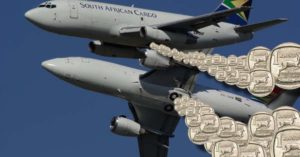2 days ago written by Grant Foster

South African Airways is so deep in the financial dwang that Standard Chartered Bank has now declined to renew their loan facilities.
 Tweet
According to a repayment schedule, SAA has listed R8,887 billion repayable in 2017/18, yet some of the maturity dates have in fact past.
Key dates that have already past include:
R0.3 billion due to STANDARD BANK on 30 December 2016;
R1 billion to STANDARD BANK on 30 December 2016;
R1 billion owed to STANDARD CHARTERED on 27 January 2017;
R1 billion owed to ABSA on 8 December 2016;
R1 billion owed to STANDARD CHARTERED on 22 December 2016;
R2.25 billion owed to VARIOUS PHOENIX on 28 April 2017; and
R0.8 billion owed to VARIOUS GBF on 28 April 2017.
Opposition party the DA says no matter how bad this may seem, this could only be the tip of the iceberg and things could be even worse. The DA’s Shadow Deputy Minister of Finance, Alf Lees, has now written to Finance Minister, Malusi Gigaba, to request that he urgently answer two vital questions:
Whether or not the other loans already overdue have been repaid and/or rolled over? and
How close is SAA to default resulting in lenders calling in government guarantees?
All of SAA’s loans are backed by government guarantees that in total now amount to R 19,1 billion.
If SAA has failed to repay some of these loans, it could force other creditors to recall their loans, which would then necessitate the government to step in and pay. This money would ultimately be taken from the public purse and could have dire consequences for the sovereign rating status of South Africa, which is already at junk status.
The fact is that the only way out of this mess is for SAA to apply for business rescue where robust cost reductions can be implemented.
The DA says a successful business rescue and the prevention of the government guarantees being called in would be have to lead to a full, or at very least a majority privatisation, of SAA in order to for SAA to survive in the long-term and importantly to release the South African taxpayer from ever having to meet the R 19,1 billion government guarantees.

